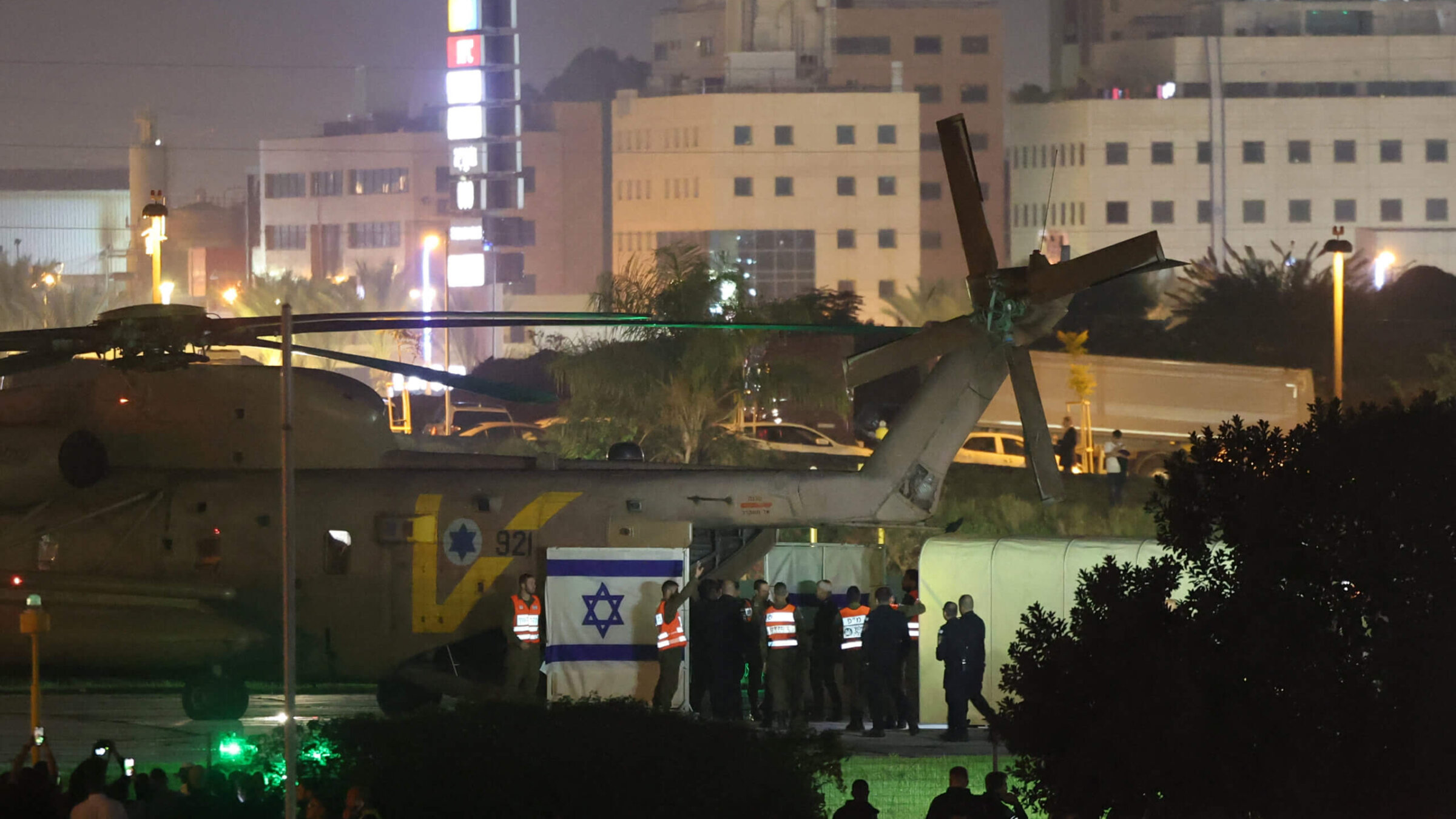The hostage release shows us this war won’t be endless — because military and diplomatic pressure work
No, Hamas didn’t agree to the hostage release deal because they’ve suddenly turned magnanimous

An Israeli helicopter transporting released hostages lands at Tel Aviv’s Schneider Medical Centre on Friday. Photo by FADEL SENNA/AFP via Getty Images
It’s a day of joy, as we welcome the 24 hostages released after seven weeks of captivity in Gaza after being kidnapped by Hamas during the Oct. 7 terrorist attack. The mere fact that almost a full day has passed without violence, and that the first of four planned hostage releases over the next four days has gone to plan, is a reason for optimism.
But the mix of emotions is overwhelming.
As the hostages return home and re-encounter their families, who have been making sure they remain relevant in the eyes of the world despite their own unbelievable suffering, it’s impossible not to feel a rush of happiness.
But there is also anxiety about their health and well-being, as well as about the conversations they will be having over the next few days when they might learn for the first time that their parents, siblings, grandparents and other loved ones were murdered by Hamas. Envisioning the released children learning about the fates of their families is heartbreaking.
And there is fury over all that happened during and since Oct. 7, and the fact these hostages had to live through all this pain and trauma. It is angering that the consequences of the trauma they carry from the experiences of Oct. 7 and the past several weeks in the hands of terrorists will echo through the rest of their lives.
It is also infuriating to realize that most of the 240 hostages taken on Oct. 7 remain in Gaza, without being treated by the Red Cross, hoping to be the next ones to be released without any guarantees that they actually will be.
Yet, today we learned something important. If the hostages continue to return home over the next few days as agreed, in exchange for an estimated 150 Palestinian prisoners, it will be a proof of concept that more deals like this could and should be explored to release all hostages still held in captivity.
This deal is proving to work because of a mix of factors. Israel’s massive and unprecedented military campaign — which has resulted in a reported two-thirds of Gaza’s population being displaced and more than 14,000 casualties (as estimated by the Hamas-run Gaza health ministry) — has, in fact, been effective in maneuvering Hamas into a corner. That’s especially true as Israel has reportedly killed a significant number of Hamas’ top operatives and destroyed parts of its infrastructure.
Make no mistake: Hamas leaders did not suddenly become humanitarians. They are responding to pressure. This temporary but necessary success shows that Israel’s military campaign must continue until we are able to secure the release of all the hostages still held in Gaza.
But the military is not the only source of the pressure on Hamas. Diplomatic efforts happening in the background simultaneously have helped.
Egypt’s role, in particular, is a reminder that Israel should continue to deepen relations with its neighbors. And it’s a call for the United Arab Emirates, and perhaps more importantly the Saudis, to become involved in negotiating further deals. Especially as Hamas loses its grip on Gaza, and a strong long-term solution involving the international community for the strip’s governance is needed, the involvement of countries like Saudi Arabia, which have historically hesitated to engage with Israel, could help legitimize among the Arab world an international effort to create a government for Gaza in tandem with Palestinian moderates post-Hamas.
So we need to scale up these efforts. More background diplomacy is needed with Qatari intermediates, with direct involvement and pressure from the United States.
We know that President Joe Biden’s administration played a crucial role in securing this deal, and that they have prioritized this issue above and beyond expectation, despite pushback within their own party. They should continue to help broker diplomatic deals, perhaps the most effective way they can help Israel at this stage.
For all of these reasons, there is one more emotion to add to the mix: hope. After these terrible weeks of collective suffering and desperation, the successful execution of the first phase of this deal can help us see some light. And, perhaps, be cautiously optimistic that the ongoing nightmare that Oct. 7 brought upon all of us could slowly become a horrible memory of the past.
A message from our CEO & publisher Rachel Fishman Feddersen
I hope you appreciated this article. Before you go, I’d like to ask you to please support the Forward’s award-winning, nonprofit journalism during this critical time.
We’ve set a goal to raise $260,000 by December 31. That’s an ambitious goal, but one that will give us the resources we need to invest in the high quality news, opinion, analysis and cultural coverage that isn’t available anywhere else.
If you feel inspired to make an impact, now is the time to give something back. Join us as a member at your most generous level.
— Rachel Fishman Feddersen, Publisher and CEO